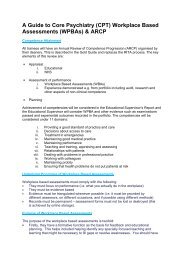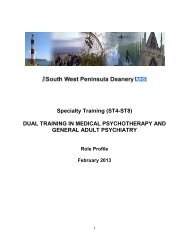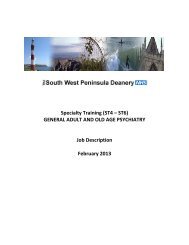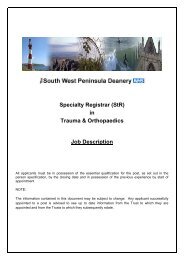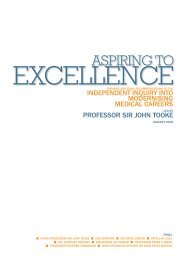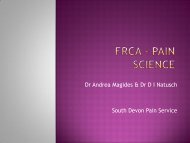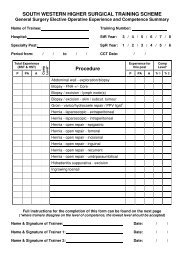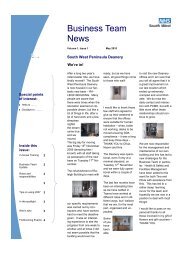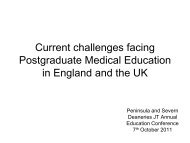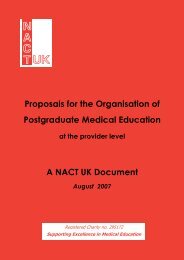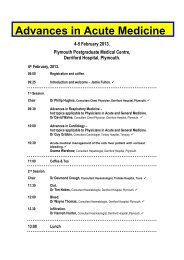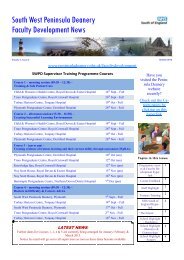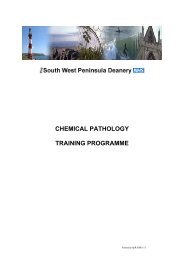Anaesthesia Trainee Case Study - South West Peninsula Deanery
Anaesthesia Trainee Case Study - South West Peninsula Deanery
Anaesthesia Trainee Case Study - South West Peninsula Deanery
You also want an ePaper? Increase the reach of your titles
YUMPU automatically turns print PDFs into web optimized ePapers that Google loves.
<strong>South</strong> <strong>West</strong> <strong>Peninsula</strong> <strong>Deanery</strong><br />
Career Planning Service<br />
<strong>Anaesthesia</strong> – <strong>South</strong> <strong>West</strong> <strong>Peninsula</strong> <strong>Trainee</strong> <strong>Case</strong> <strong>Study</strong><br />
Your background prior to studying medicine<br />
I went to medical school straight from 6 th form.<br />
The reason for choosing <strong>Anaesthesia</strong><br />
I didn’t always want to be an anaesthetist! I had very little exposure to anaesthesia during<br />
medical school and embarked on an ‘Acute Specialities’ rotation with a view to a career in<br />
Emergency Medicine. This rotation had 18 months of anaesthesia, medicine and A&E. It<br />
took less than 6 months though, for me to decide anaesthesia was what I wanted to do.<br />
I gradually became more confident, especially when dealing with critically ill patients, which<br />
stood me in good stead for the medical job which followed. I learned to appreciate what it<br />
really meant to be working as part of the theatre team.<br />
The variety of patients we see in terms of age, pathology and personal needs is huge and I<br />
enjoy the fact that anaesthesia crosses paths with so many other disciplines in medicine. I<br />
have always been fascinated by physiology and am pleased that I have had to study it in so<br />
much depth, not only for the exams, but to gain a much better understanding of pathology,<br />
particularly in the acute and critically ill.<br />
It goes without saying that the enthusiasm and commitment from the consultant<br />
anaesthetists for training and teaching has perpetuated much of my passion for anaesthesia<br />
and I still have a lot to learn (I’m about to embark on SpR Training) but I am confident in my<br />
choice of specialty and looking forward to what’s ahead……After all, who knows how old<br />
we’ll be when we can draw a pension!<br />
The reality of working in <strong>Anaesthesia</strong> as a trainee doctor<br />
Starting in anaesthesia can be a little daunting, especially the first few weeks. The operating<br />
department is a unique environment; everyone dressed the same, which doors you can and<br />
can’t go through and (the 8 th deadly sin) of wearing someone else’s shoes! Don’t be put off<br />
by this!<br />
<strong>Anaesthesia</strong> is a specialty where you have to build up gradually. You won’t be left alone to<br />
begin with and will be expected to discuss everything with one of your seniors. As you pick<br />
up speed you will be gradually left to do more but, in my experience, help and advice has<br />
always been available when needed.<br />
There is a huge variety of problems you will be exposed to from the chronically ill, elective<br />
surgery, major trauma, ICU, difficult airway management, pain, obstetrics (including on-call<br />
cover for the delivery suite) and resuscitation.<br />
The anaesthetic department I work in has over 40 consultants and I’ve worked with all of<br />
them at one stage or another. This gives you a great opportunity to learn many different<br />
techniques and skills and also to develop your own practice (and style!). The possibilities are<br />
endless!<br />
Page 1<br />
I:\Careers Planning\Careers Information\A-Z Careers Information<br />
Sheets\<strong>Anaesthesia</strong>\<strong>Anaesthesia</strong>_<strong>Trainee</strong>_<strong>Case</strong>study_August09.doc
It takes about 3 months before going on the on-call rota. There are competency<br />
assessments at all stages along the way. An SHO rotation will usually incorporate at least 3<br />
months of ICU which, along with a minimum of 21 months in anaesthesia and the primary<br />
FRCA, are minimum requirements in order to get an SpR post.<br />
That being said…this may change next year with MMC. At the moment, you usually aim to<br />
have passed the final FRCA by the end of the 2 nd SpR year and then continue to completion<br />
of the CCST. Most SpR rotations incorporate a year which can be used for ‘off-rotation’<br />
training e.g. working abroad, research, sub-specialisation, but these do have to be approved<br />
for the appropriateness in terms of training, and it’s best to start planning this early.<br />
Daily activities and responsibilities<br />
If possible, the day begins the evening before by seeing the patients pre-op. I say ‘if<br />
possible’ because many patients now come in on the day of the surgery but still all need an<br />
anaesthetic assessment before the list starts. This can make the beginning of the morning a<br />
little hectic…but also a bit of a challenge! You must make time to go and see the patients<br />
first. The consultants, entirely reasonably, will not be impressed if you roll up to theatre at 9<br />
o’clock looking bleary eyed from the night before. You have to be prepared for the lists.<br />
Generally you would be on a consultant-led list throughout the normal working week, but<br />
again the number of solo lists increases alongside your experience. The patients remain<br />
your responsibility in recovery and you may well be called to assess pain, vomiting and other<br />
problems. It’s useful to go and see the patients post-op…Have you given them enough/ too<br />
much analgesia? Has your nerve block/ epidural worked?<br />
At the moment, my on call commitments involve anaesthetics cover for the delivery suite. I<br />
think this is an especially challenging and rewarding environment to work in. It’s very<br />
satisfying to get an epidural up and running, but there can be life-threatening emergencies<br />
which occur completely out of the blue. You have to be on your toes!<br />
Wherever you’re working (be it in theatres, delivery suite, ED) we’re part of a large team. Not<br />
all health professionals will have experience of anaesthesia or appreciate the nuances of a<br />
particular case. Communication is vital. It is often necessary, for example, to discuss the<br />
relative urgency of a case with the surgeon in terms of theatre time, other cases waiting to<br />
be done and the expertise of the staff available. Not always easy!<br />
Likewise, there will sometimes be difficult discussions with patients and their relatives. I’ve<br />
found that asking a senior to come and listen to you take a history or break bad news is<br />
exceptionally helpful. The feedback will be invaluable and although these discussions won’t<br />
get any easier, you will get better at it!<br />
Suggestions for personal development and managing change<br />
Medicine is a huge discipline and, I know that when I started out, I didn’t know quite where I<br />
would fit in. I think once you’ve chosen the specialty that suits you, it does get a bit easier.<br />
Initially time is spent on exams and progressing up the career ladder and that’s usually pretty<br />
well structured. But, I also think it’s important not to forget why you went into medicine in the<br />
first place. My drive came from visiting a war-torn country and working with a Non-<br />
Governmental Organization just before I started medical school. Everyone’s motives will be<br />
different.<br />
There are regular appraisals and assessments which give you a chance to take stock of<br />
where you’re up to. I think it’s important to set short and long-term goals. There’ll always be<br />
exams, assessments, audits, etc…but I think it helps to have an idea of where you would like<br />
to be in 5 or 10 years.<br />
Page 2<br />
I:\Careers Planning\Careers Information\A-Z Careers Information<br />
Sheets\<strong>Anaesthesia</strong>\<strong>Anaesthesia</strong>_<strong>Trainee</strong>_<strong>Case</strong>study_August09.doc
This can also be helpful when it comes to discussing your plans at appraisals or in just<br />
getting informal advice. I’ve found the help and advice from consultants/SpRs invaluable and<br />
they will help you stay focused on the right track. It’s easy to get overwhelmed by exams and<br />
the ongoing workload. It’s best to talk it through; everyone will have a different opinion, but at<br />
least you can make up your own mind after hearing some alternative points of view.<br />
Ways to achieve a successful work-life balance<br />
If I say ‘friends and family’, does that sound lame? I think it’s true. <strong>Anaesthesia</strong> can be busy,<br />
stressful, exciting and rewarding all at once! I often find it necessary to talk through cases<br />
with other trainees or consultants. I hardly ever make it to the Dr.’s Mess at lunchtimes<br />
because I usually have patients in recovery or will be seeing patients for the afternoon. Also,<br />
I tend to be either working with a Consultant Anaesthetist or on my own, so there’s not<br />
always a lot of contact with other juniors during the day; you may feel a little more isolated<br />
from your colleagues than in other specialties.<br />
Make sure you make time for rest and relaxation. I enjoy diving and, believe me, I’m not<br />
thinking about work as I’m floating around under-water! Do whatever works for you!<br />
Snapshot of your career path to date<br />
PRHO jobs → Acute Specialties Rotation → Hyperbaric Medicine → <strong>Anaesthesia</strong><br />
Career goals for the future<br />
I’m glad to say I’m staying put in anaesthesia now! The next major hurdle for me is the Final<br />
FRCA, but I’m looking forward to embarking on SpR training and am especially keen on<br />
anaesthesia for ENT. I’m also planning to spend time working in developing countries and<br />
those effected by violent conflict and hope to use my off-rotation training for this…something<br />
to look forward to while burning the midnight oil for exams!<br />
Page 3<br />
I:\Careers Planning\Careers Information\A-Z Careers Information<br />
Sheets\<strong>Anaesthesia</strong>\<strong>Anaesthesia</strong>_<strong>Trainee</strong>_<strong>Case</strong>study_August09.doc



